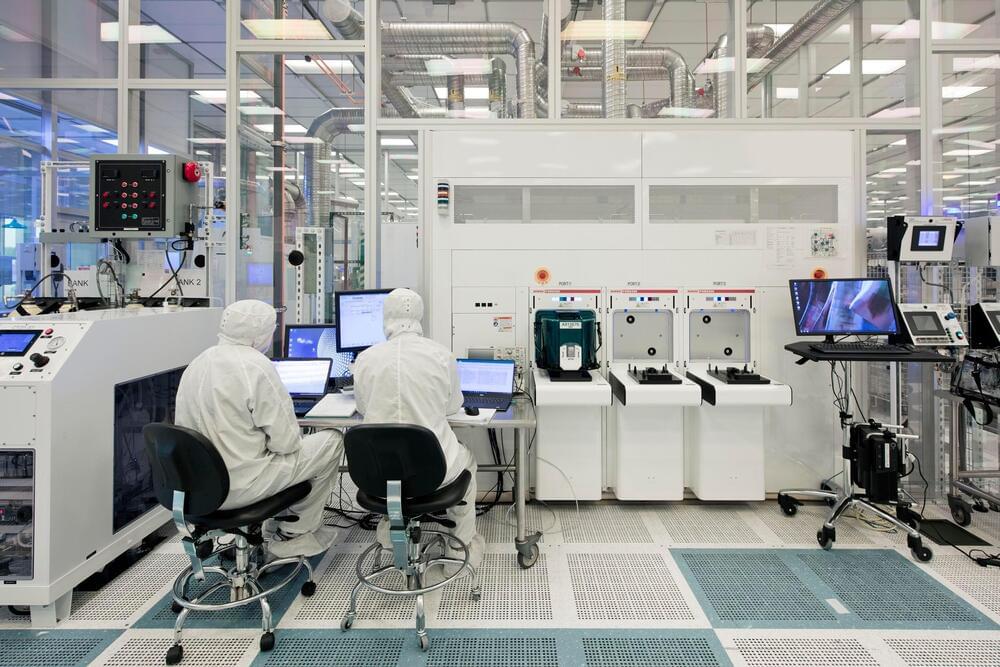Welcome to the first chapter of our audiobook on personal finance! In this chapter, we’ll be exploring the basics of money and how we use it in our daily lives. We’ll cover topics like what money is, how we earn it, and how we can use it to buy the things we need and want. We’ll also talk about the different forms money can take, like cash, checks, and credit cards. Whether you’re just starting to learn about personal finance or you’re looking to brush up on the basics, this chapter is a great place to start. So grab a pair of headphones, sit back, and let’s get started!
Category: finance – Page 63

Could Twitter Be Elon Musk’s ‘Greatest Investment Ever’? Jim Cramer Isn’t Betting Against The ‘Underestimated’ Tesla CEO
In April, Tesla Inc TSLA CEO Elon Musk said he was done selling Tesla shares to help finance his ongoing overhaul at Twitter.
Since then, he jettisoned more than $20 billion worth of Tesla stock and has continued the selling spree this week.
As the stock continues to skid, Jim Cramer sees an electric buying opportunity.
Stentrode brain computer interface online in first two human patients
Synchron, a neurovascular bioelectronics medicine company, today announced publication of a first-in-human study demonstrating successful use of the Stentrode™ brain-computer interface (BCI), or neuroprosthesis. Specifically, the study shows the Stentrode’s ability to enable patients with severe paralysis to resume daily tasks, including texting, emailing, shopping and banking online, through direct thought, and without the need for open brain surgery. The study is the first to demonstrate that a BCI implanted via the patient’s blood vessels is able to restore the transmission of brain impulses out of the body, and did so wirelessly. The patients were able to use their impulses to control digital devices without the need for a touchscreen, mouse, keyboard or voice activation technology. This feasibility study was published in the Journal of NeuroInterventional Surgery (JNIS), the leading international peer-review journal for the clinical field of neurointerventional surgery, and official journal of the Society of NeuroInterventional Surgery (SNIS).

Elon Musk sells nearly $3.6 billion of Tesla stock this week
Making the total amount of sold Tesla stocks nearly $40 billion over the past year.
Tesla CEO, Elon Musk, has been on a selling spree of his company’s stock this year. Earlier this week, Musk sold 22 million shares over a period of three days, a filing with the U.S. financial regulator has revealed, the BBC
Musk, who rose to the top of the world’s wealthiest people list last year riding on Tesla stock price, has spent most of 2022 dealing with this start-again-stop-again campaign to acquire Twitter. Musk, who was quite secretive about acquiring Twitter stock at the beginning of the year, shocked many by declaring his intent to buy out the social media company and take it private.

FTX caught depositing 8 billion dollars of customer money into secret accounts
In a move to protect SBFs hedge fund from losing billions software code was altered.
Sam Bankman-Fried owned Alameda Research, a hedge fund heavily invested in FTX. In move to make sure the hedge fund assets were never sold off, when FTX began to have issues, an engineer secretly changed software code in the FTX system. The software would have sold off all Alameda Research assets, just like any other companies that were owned, in the case of FTX filing for bankruptcy.
Getty Images.
The FTX exchange code was tweaked in the Mid 2020s, to make sure Alameda Research was protected from an automatic sell off of assets, if the hedge fund was losing to much borrowed money.

Space imaging company Maxar agrees to $6.4 billion takeover
“Advent has a proven record of strengthening its portfolio companies and a desire to support Maxar in advancing our long-term strategic objectives,” Maxar CEO Daniel Jablonsky said in the statement. “As a private company, we will have enhanced flexibility and additional resources to build on Maxar’s strong foundation, further scale operations and capture the significant opportunities in a rapidly expanding market.”
With some $28 billion invested across the defense, security and cybersecurity sectors in the last three years, Boston-based Advent’s portfolio companies support many satellite and defense platforms which serve the U.S. government and its allies as well as companies across the globe. The firm said it arranged debt and equity financing commitments to finance the acquisition.
The transaction is expected to close mid-2023, subject to customary closing conditions. Maxar, which has 4,400 employees, will operate under the same brand and maintain its headquarters in Westminster, Colorado, and will remain U.S.-controlled and operated.

Exclusive: ChatGPT owner OpenAI projects $1 billion in revenue by 2024
The forecast, first reported by Reuters, represents how some in Silicon Valley are betting the underlying technology will go far beyond splashy and sometimes flawed public demos.
OpenAI was most recently valued at $20 billion in a secondary share sale, one of the sources said. The startup has already inspired rivals and companies building applications atop its generative AI software, which includes the image maker DALL-E 2. OpenAI charges developers licensing its technology about a penny or a little more to generate 20,000 words of text, and about 2 cents to create an image from a written prompt, according to its website.
A spokesperson for OpenAI declined to comment on its financials and strategy. The company, which started releasing commercial products in 2020, has said its mission remains advancing AI safely for humanity.
Singing inverters show electrical harmony for renewable power systems
Standing among solar arrays and power grid equipment at the National Renewable Energy Laboratory (NREL), you might hear a faint, distorted melody buzzing from somewhere. You are not hallucinating—that gray box really is singing the Star Wars Theme, or the ice cream truck song, or Chopin’s Waltz in A minor. Power system engineers are just having some fun with an NREL capability that prevents stability problems on the electrical grid.
Usually, the engineers send another kind of waveform through the inverters and load banks: megawatts of power and voltage vibrations at many frequencies. The purpose of their research is to see how energy devices and the grid interact—to get them “in tune” and prevent dangerous electrical oscillations that show up like screechy feedback or a booming sub-bass.
The engineers can do this analysis at high fidelity with NREL hardware using the lab’s advanced impedance measurement system, and they have also produced a commercially available software called the Grid Impedance Scan Tool or GIST that can do the same with simulated power on device models, allowing any manufacturer or grid operator to certify grid stability with renewable energy resources.
Dr. Tobias Reichmuth, Ph.D. — Maximon — Structuring, Financing & Growing Novel Longevity Ventures
Structuring, Financing & Growing Novel Longevity Ventures — Dr. Tobias Reichmuth Ph.D., Founding Partner, Maximon
Dr. Tobias Reichmuth, Ph.D. is Founding Partner at Maximon (https://www.maximon.com/), The Longevity Company Builder, which empowers entrepreneurs to build impactful, science-based and scalable companies providing healthy aging and rejuvenation solutions.
Maximon recently announced the launch of their 100 million CHF Longevity Co-Investment Fund, which will be looking to invest up to CHF 10 million per company, which allows them to finance up to 10–12 start-ups in this fast growing industry over the next four years.
In 2020, Dr. Reichmuth launched the Longevity Investors Conference together with Marc P. Bernegger, another Maximon Founding Partner.
Dr. Reichmuth previously founded the climate-change infrastructure fund / asset management company SUSI Partners AG, where he spent over a decade specializing in infrastructure investments in the context of energy transition (renewable energy, energy efficiency, energy storage solutions) and invested more than one billion Swiss francs.

Japan’s New Semiconductor Foundry Rapidus Taps IBM For 2nm Process
Japan wants to get back into the leading-edge semiconductor business and very recently a new company was formed to reboot its semiconductor industry. The company is named Rapidus, referring to rapid production of new chips, a clear reference to how the company plans to differentiate its business from other foundries such as TSMC, Samsung, and Intel. The company has announced a partnership with IBM Research to develop IBM’s 2nm technology in fabs that Rapidus plans to build in Japan during the second part of this decade. Previously, Rapidus announced a collaboration with the Belgium-based microelectronics research hub IMEC on advanced semiconductor technologies. Imec is collaborative semiconductor research organization working the world’s major foundries, IDMs, fabless and fablite companies, material and tool suppliers, EDA companies and application developers.
The IBM process uses gate-all-around transistors — IBM refers to them as nano sheet FETs — which is the next generation of transistor design that enables device scaling beyond today’s FinFETs. The 2nm structures will require Rapidus to use ASML’s EUV manufacturing equipment. Business details with IBM were not disclosed, but there’s likely two parts to the deal: a cross-licensing agreement for the intellectual property necessary to build the product and a joint development agreement. While the announcement is nominally for IBM’s 2nm process, it likely includes a long-term commitment to build advanced semiconductor chips going beyond the 2nm process node.
Rapidus was formed by semiconductor veterans such as Rapidus President Atsuyoshi Koike, with backing by leading Japanese technology and financial firms, including Denso, Kioxia, Mitsubishi UFJ Bank, NEC, NTT, Softbank, Sony, and Toyota Motor. The Japanese government is also subsidizing Rapidus. The big change for Japan compared to prior national efforts is the collaboration with international organizations. It’s a recognition Japan cannot go it alone. This appears to be a fundamental change in Japanese attitudes. Building a fab in Japan will be helped by Japan’s strong manufacturing ecosystem of materials, equipment, and engineering talent.